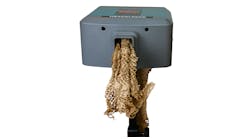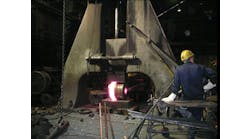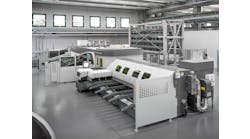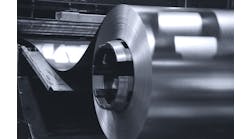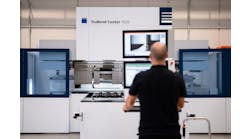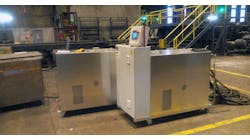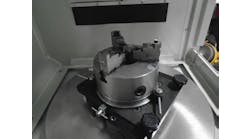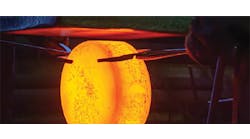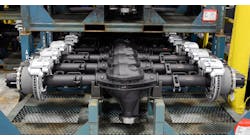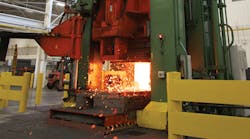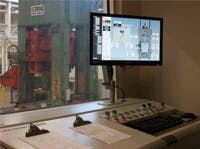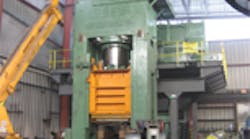"The capabilities of the press have exceeded our expectations," according to McInnes Rolled Rings vice president Paul Janicke. He was describing a new blanking press supplied to the Erie, PA, producer of seamless rolled rings weighing up to 10,000 lb, and ranging in size from 4 to 144 in. (100-3,660 mm), in carbon, alloy, and stainless steel grades. The 3,500-ton press was custom designed by Erie Press Systems, as part of an expansion project that centered on a new, 160/160 radial-axial ring rolling machine built by SMS Meer GmbH Ring Rolling Division (Wagner), in conjunction with Girard Associates.
McInnes Rolled Rings started operation in 1992 and produces seamless rolled rings exclusively. A Wagner 63/63 radial axial ring-rolling mill and a 1,200-ton Erie Press machine for rolled ring preforms are installed in the original, 60,000-ft2 building. Quenching and tempering capabilities were added in 1996, and a smaller ring mill (Wagner KFRW 630) was inaugurated in 2003.
The new SMS and Erie Press machines are housed in a 60,000-ft2 expansion of the original plant.
"A considerable effort was put into providing performance and controls that best fit our operation," Janicke continued about the new blanking press. "We are very pleased with the results. Erie Press Systems has supplied us with a critical piece of equipment that helps us meet our customers' needs for quality, speed and flexibility."
The new blanking press is making it possible for McInnes to expand its customer base with products for power transmission, energy, and commercial/aircraft bearing markets.
According to Erie Press, the machine also achieves a significant level of energy savings in its operation thanks to variable-frequency drives installed for the eight 300-HP main motors. The power control capability adjusts motor speed according to the required flow, and then "turns off" a motor when pump flow is no longer required. This avoids wasting energy during idle periods, which Erie Press estimated at 30% of a motor's typical full-load current.
"This press design demonstrates Erie Press Systems' commitment to develop extremely energy-efficient presses while maintaining the high performance standards and robustness required in the forging industry," according to sales manager Bill Goodwin.
Other operating advantages for McInnes Rolled Rings will be a reduced level of noise throughout the manufacturing cycle; reduced pump wear, because there are fewer rotations; lessened cooling demand; and fixed displacement pumps rather than servo pumps.
The blanking press is monitored from an HMI with animated displays of each hydraulic manifold, showing the status of solenoid valves, proportional valves (commanded and actual position), press ram position, auxiliary axis positions, motor voltage and amperes, and hydraulic pressures.
Operating features of the new blanking press include a sliding bottom bolster, punch cooling and lubricating system, punch swing arm, shear cylinder, billet/blank centering mechanism, web/slug removal, and scale removal device.
